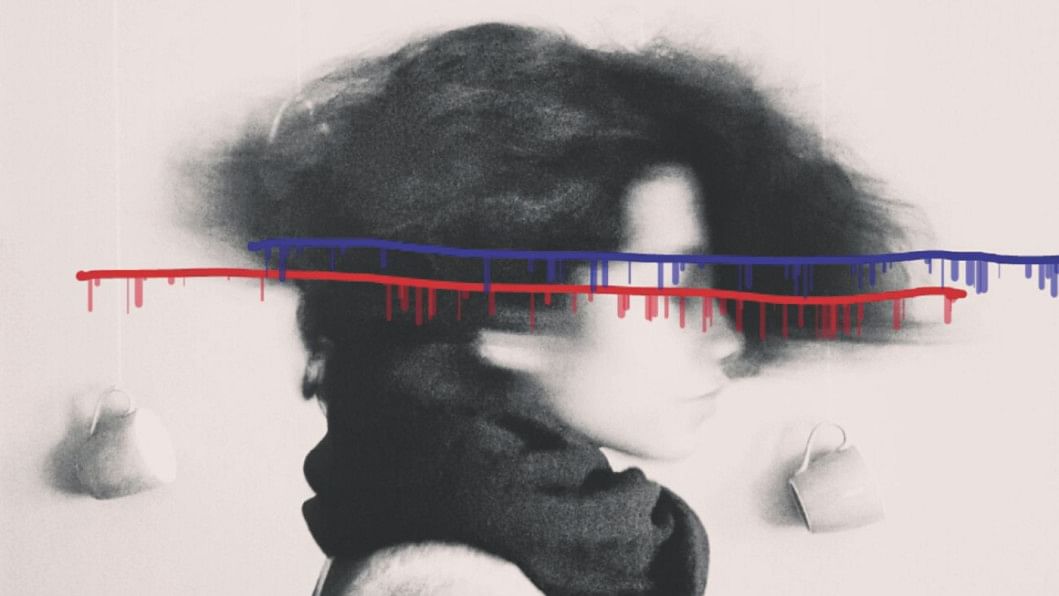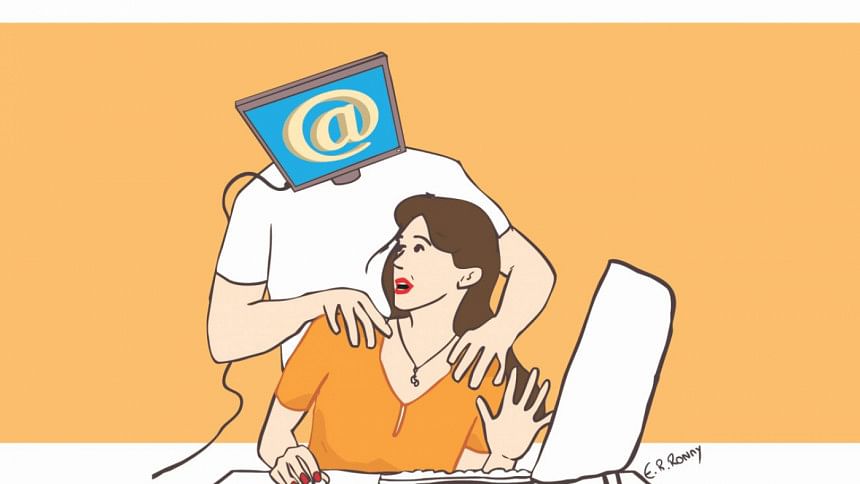Digital Sexual Harassment in Digital Bangladesh

FOR 16-year-old Rabeya* living in a small town in Sylhet, the introduction of the Internet was a blessing in many ways. With strict parents who did not allow her to go out of the house alone, she was glad to have access to another world where there was no one overseeing her interactions or telling her what to do. Before long, she developed a relationship with a man who claimed to be working in a bank in Dhaka, with whom she shared intimate details of her life. After a few months of chatting, he demanded that she send him explicit pictures of herself. When she refused, his whole demeanour towards her changed; he began to send her highly inappropriate images and videos and make derogatory comments about her appearance and character. As Rabeya tried to block and delete him from his friend list, he threatened to call her parents and tell them what a "whore" she was.
The images, threats and calls became more frequent and more offensive as days passed, and with no one to ask for help, a traumatised and scared Rabeya, who blamed herself for it all, finally reached her breaking point and attempted suicide.
Although she survived, the episode left a deep scar in Rabeya; she developed a mistrust of everyone around her and continued to suffer from clinical depression. Her parents, upon learning what had happened, forcefully married her off to a man 10 years older than her.
Incidents like this – and much worse – take place in Digital Bangladesh every day. A disproportionate number of women and girls who use digital platforms are affected by some form of cyber harassment over their lifetime. But in a country where sexual violence of the most visible kinds in public spaces, homes and workplaces go unpunished, incidents of cyber sexual harassment and/or cyber bullying are hardly ever publicly highlighted by victims, activists or lawmakers, or reported to the police.
What does cyber sexual harassment look like?
Cyber sexual harassment can range from lewd comments on Facebook and Twitter to uploading a girl's image on a public forum without her consent, from exhibition of unwanted sexual attention to distribution of pornographic materials online. The harassers are not always complete strangers, but may also be friends or acquaintances from off-line social interactions.
"When I was doing my O levels, there was this group of 4-5 boys who liked me at the same time. They had all asked me out separately but I wasn't interested. They decided to take revenge by taking my photo on MSN, photoshopping a naked body to my face and sending it to everyone in the class, and to my brother," says Nawsheen Zaman*, a young professional. "The photo looked so real that my brother nearly threw up. I couldn't go to class for about two weeks after that because everyone called me a slut and made fun of the whole thing. One of them also threatened to send the photo to my parents if I didn't answer his calls all the time. They also opened a fake Facebook account with those photos."
When such incidents happen, most girls do not report it to the school authorities or tell their families for fear that they would be blamed, and their characters questioned. In a country where sex is a taboo topic, some are too embarrassed to bring up the issue with elders or even their same-age cousins, and are left to deal with the harassment – or the subsequent trauma caused by it – themselves. They are not aware of the kinds of dangers they are exposed to online, or of the legal and institutional support that are available to them (if any).
Rita Haq*, student of Class IX, talks about why she never shared her story of harassment with anyone: "I used to Skype with a close male friend who was living at UK. One day, I don't know if he was drunk, but he turned on his camera and he was naked, showing me his thing! I couldn't tell anyone about it. We had many common friends and I was afraid that people would exaggerate and say bad things about me. Maybe they would have said I had engaged in cyber sex."
The dissemination of pictures of a woman without her consent has become a pervasive form of sexual harassment. These may be explicit images or videos that were shared with a boyfriend, which are then circulated once the relationship turns sour, or profile pictures that are taken out of context and put in different disreputable websites.
A vocal young women's rights activist says, "There is a Facebook page with an extremely offensive title. Someone (a fake profile) took photos of me, from different places – friend's albums, my own profile pictures, photos from public events – and posted them on the page. My friends and I have tried to get Facebook to take the page down, and remove the photos, but they have continuously responded that the page does not break any of their community rules, even though the page mainly has pornographic images on it. I decided to give up after sometime."
Sexual harassment online that most often goes unheeded is offensive comments and images targeted towards particular women or women in general, often to put them "in their place". After the sexual assault incident(s) in TSC on Pahela Baishakh, we witnessed a horde of such remarks, including public proclamations that women should be raped. Take for instance, the post of a user named Arefin Ahmed Shehim, who, implying that the girls deserved much more than groping, wrote: "I will openly rape you [girls] on the streets. I believe in direct action… As long as you show [your skin] we will touch you." On pictures of a prominent young leftist activist, people left images of penis, explicit photoshopped pictures and comments which are so appalling that they cannot be repeated on a national daily. "This is how Shibir should f*** her" under a manipulated image was among the more "civilised" of posts.
Female bloggers and writers who are vocal on social issues and women's rights are now being targeted specifically for their views, with entire online groups ganging up on one woman. The editor of feminist blog, WomenChapter, says that her whole Facebook wall two days ago was inundated with offensive comments using the "F" word in retaliation to some of her posts. "I know who the people are but in a country where police beat activists protesting sexual assaults, what justice can I expect?"

Reporting cyber sexual harassment
In most cases, women feel that reporting the incidents would not bring them any justice; rather, it would give rise to intrusive questions about her character and bring disgrace to her and her family. If the incidents are of a less severe nature (such as offensive comments on Facebook), they think that authorities would dismiss them as insignificant.
"We do not usually get cases of cyber sexual harassment, and even in the rare instances that we do, in the end, women don't want to go to court, for fear of societal and institutional discrimination," says Salma Ali, the Executive Director of Bangladesh National Woman Lawyers Association (BNWLA).
Nina Goswami, Senior Deputy Director, Mediation and Rapid Response Unit of Ain O Salish Kendra (ASK), notes that women have to undergo further victimisation and harassment when they try to report or file cases. For instance, if a woman goes to the police with complaints that explicit pictures of her are being disseminated, the police (may) seem more interested in hearing the details of her relationship and ogling at the pictures than in helping her.
Meanwhile, even if a girl is brave enough to report the crime, it doesn't mean that justice will prevail in the end. Barrister Sara Hossain, Honorary Director of Bangladesh Legal Aid and Services Trust (BLAST), gives the example of a female university student who filed a case both with the police and informed the university. "Astonishingly, the university expelled the girl, claiming that they were in possession of obscene photographs of her engaging in immoral activities. The case went to the High Court, and eventually the High Court, in a bench headed by a 'progressive' judge, found against the girl on the basis that she had consented to having her photographs taken at one point in time," she comments. "What the Court failed to note was that while she may or may not have consented to the relationship initially, and may also have consented to photographs of her being taken for their private use while they were in a relationship, she had never consented to the distribution of the photographs in public."
Entrenched patriarchal attitudes of institutions that are supposed to protect women from such harassment mean that women shy away from seeking redress. In addition, law enforcement agencies often do not have the technical know-how or the political will to address cases of cyber sexual harassment.
Nina Goswami states that oftentimes it's difficult to identify the perpetrators as they use fake profiles and addresses. The police are hardly ever helpful in tracking them, she adds.
However, if law enforcers can trace people from across the county for making derogatory comments about the Prime Minister online, then it follows that they have the ability to do so for other threats, including from sexual harassers. No law enforcement agency, however, as of now, monitors content on the web to identify cyber sexual harassers proactively. Only when cases are filed (if then) do they move forward.
On April 21, two Supreme Court lawyers filed a general diary with the Banani Police Station against Arefin Ahmed Shehim for the post highlighted above declaring that he would rape any woman who shows skin.
With social media inundated with such messages, the lawyers state they wanted to encourage other citizens to take legal actions against the perpetrators instead of just raising their voices on social media.
"Openly threatening rape and inciting others to participate in rape are criminal acts that can and must be brought to justice," says one SC lawyer.
When contacted on May 14, Banani Thana OC Bhuiyan Mahbub Hasan informed that "investigation was underway" and that they were working with the DB to identity the perpetrator. He added that he was not under liberty to divulge the progress they had made as it might "hamper" the investigation.
Stating that this was the first time a cyber sexual harassment crime had been reported to his Thana, he promised that all such cases would be treated in an efficient and sensitive manner. "We will use our best IT experts to solve these cases," he added.
Rights activists urge affected women to break the silence and report such cases. Salma Ali asserts that human rights organisations would do everything in their power to protect women's privacy, conducting the proceedings in a closed court and ensuring that they do not have to undergo additional harassment from state institutions.
Are existing laws enough?
Legal experts note that cases can be filed under the existing Women and Children Repression Prevention Act 2000 (amended 2003), Information and Communications Technology (ICT) Act 2006 and Pornography Control Act 2012. However, there is no comprehensive law or section adequately dealing with sexual harassment in social media and other digital platforms.
"The problem is that our laws have not been effectively updated to deal with offences that use digital media, and our evidence laws are still so archaic that they don't allow for use of electronic evidence," argues Sara.
Section 57 of the ICT Act states that anyone can be penalised for "any false and obscene posts online" for a maximum of 10 years and maximum fine of 1 crore. However, it does not define what constitutes "obscene".
She notes, "Only one or two cases have been filed using the ICT Act for online sexual harassment. As to why the law is not being used to deal with such cases as diligently as it is for defamatory comments made about religion or political figures remains a question. The police, too, do not seem to be using their powers to address such hateful content."
Experts note that laws can be used once the crime has been committed, but some regulatory measures must be put in place to prevent these crimes and hate speech from being generated on social media platforms in the first place.
Bangladesh Telecommunication Regulation Commission (BTRC) has the authority to monitor hateful content, such as death threats and derogatory comments targeted against particular communities. However, they don't seem to be focusing on these issues, argues Sara. "Of course, the question then arises: what do you prioritise more, the immediate death threats against bloggers, for instance, or the general hate speech on social media? The problem is that our regulators don't seem to be doing either."
It's a fine balance between wanting more regulation of social media and wishing it to remain a free space where people can speak their minds. "People need to understand that freedom of speech does not mean freedom to say hurtful and offensive things," says Nabila Chowdhury, a blogger.
The cyber space is an extension of the real world; as such, the jingoistic attitudes and patriarchal norms we face on a daily basis in private and public spaces are reflected in the cyber domain as well. Without any protection or systematic support extended to female users, Digital Bangladesh, like real Bangladesh, will continue to be a male-dominated space in which women remain vulnerable.
Illustration: Ehsanur Raza Ronny

 For all latest news, follow The Daily Star's Google News channel.
For all latest news, follow The Daily Star's Google News channel. 



Comments